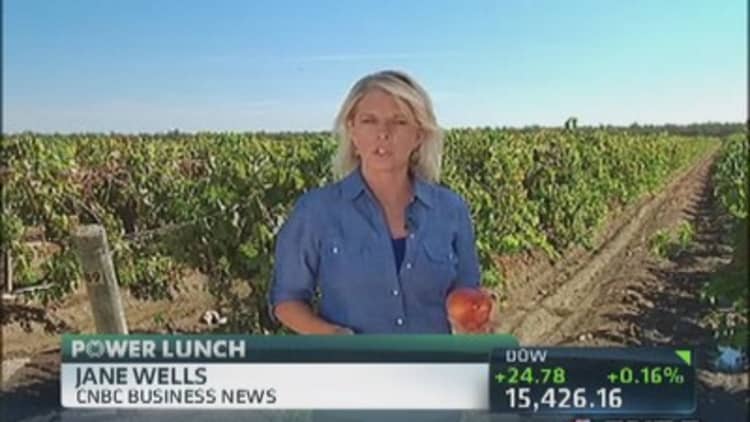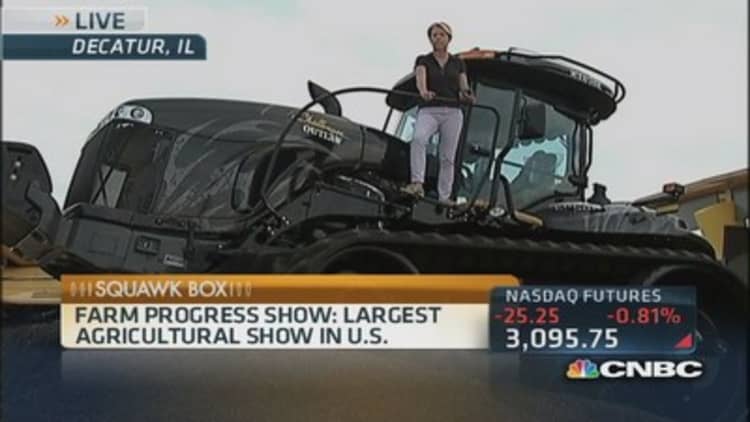The Gerawan family has been farming in California's Central Valley for more than 60 years, expanding to become the nation's largest peach producer. Dan Gerawan hires thousands of farm workers every year, and prices have been good. But now he's dealing with a blast from the past that is sending ripples across the Golden State's agricultural community like a Steinbeck novel, except with more lawyers.
Over two decades ago, in 1990, the United Farm Workers organized laborers working for Gerawan Farming and, after legal skirmishes, the UFW was certified to represent those workers in 1992.
Contract negotiations began. There was one meeting.
And then…nothing. The UFW never came back, there was never any contract, and Gerawan Farming went back to business.
Until now. Last year, the UFW returned.
"We have nothing but chaos since," said Dan Gerawan. He received a letter from the union in October stating it was ready to negotiate a new contract. "I had to read the letter twice to believe it."
Gerawan said his farm pays higher wages than the competition, and his operation even provides some benefits. "Our employees like that, and that's why they work here," he said.

However, his lawyers told him that since workers never decertified the union, he had to negotiate with the UFW.
Unlike the early '90s, the UFW is now able to take advantage of newer laws in California that force both sides to accept a contract through mandated arbitration by the California Agricultural Labor Relations Board. Gerawan said once arbitration began, the union "proposed wage increases that were ridiculous."
He fears the ALRB will side with the union, and the arbitrator's decision is final.
"It's not a negotiated contract at all. A state arbitrator is writing the contract, wages and all, and is going to impose it on us," he said. However, he can appeal the contract in court.
(Read more: Farming gets its own 'Apple v. Windows' battle)
None of that will matter if farm workers decertify the union before a contract is handed down, and the race is on to do just that.
"Having the UFW is like having two bosses, and we don't want that," said 15-year employee Silvia Lopez, who led a campaign to collect enough signatures to bring about a decertification vote. Lopez said friends and family who work in unionized operations tell her they pay too much in dues and do not get enough in return.
"They're not happy with the UFW," she said.
Lopez insisted she is not being pressured or rewarded by Gerawan for trying to get rid of the union. She didn't even realize she'd been working in a UFW shop all these years. When she found out, and learned she would have to give 3 percent of her pay in dues, "I went like, 'What?'"
As for the possibility the UFW would negotiate pay and benefits in excess of the cost of dues, Lopez shook her head. "I don't believe that," she said. "I don't believe that at all."

In a statement to CNBC, the UFW said it's making headway in the Central Valley raising wages for farm workers. "We continue to push for more rights such as just cause provisions and seniority," said communications director Maria Machuca. "Perhaps not surprising, Gerawan as the employer is trying to get rid of the union that is winning these wage increases."
(Related video: AFL-CIO invites nonunion workers to be members)
The farmer replied, "We think it's unfair that almost a quarter century later, the union comes back and basically tells the workers, 'You're going to pay us 3 percent of your money or you're going to be fired.'"
The union would not say why it suddenly returned after two decades, but Gerawan believes he knows the motivation. Government figures show the UFW spent over $1 million more than it took in last year. "My assumption is they need dues, and where best to get them than from the highest paid ag workers?"
Both sides have accused each other of smear tactics, coercion and threats. Lawsuits and unfair labor practice complaints have become as much a part of the landscape as almond trees and grapes.
(Read more: Bangladesh garment workers protest, factories shut)
"In fact, this interview itself will probably result in an unfair labor practices charge against me," said Gerawan. A judge recently ordered a temporary restraining order against the farmer and his managers to bar them from encouraging employees to push out the union.
The UFW's Machuca told CNBC, "We have presented to the ALRB evidence from workers stating that Gerawan management threatened and coerced workers in order to get signatures to decertify the UFW."
She said even after the restraining order was issued, there's evidence "Gerawan has ignored the injunction and continued to be illegally involved in decertification process."
At the same time, Lopez claims she felt threatened gathering signatures. "The UFW went to look for me at my house," she said. "My question is, why are they looking for me when they know that I don't want them? That makes me not feel safe."
It could all be over soon.
(Read more: Gartman: US jobs will have to hit 250K before Fed tapers)
Lopez said she turned in 2,700 to 2,800 signatures for a decertification vote, which would be more than enough. However, the ALRB may block a vote if it believes too many signatures are invalid, or if it believes the signatures were gathered at the farm's behest. This week some of the workers protested outside the ALRB's regional offices, demanding a chance to vote.
The ALRB told CNBC it will decide by Friday if a vote can proceed. If not, it will move forward in implementing a new contract. "ALRB members are unable to comment on pending election matters," the board said in a statement.
In the meantime, the fruit has to be picked, and the orchards are full. But not since the days of Cesar Chavez has a labor dispute so gripped California's bountiful heartland.
"Everybody's watching what happens to us," said Gerawan.
—By CNBC's Jane Wells; Follow her on Twitter: @janewells.


